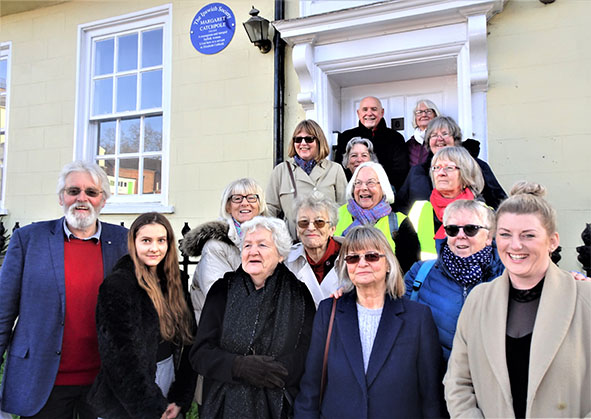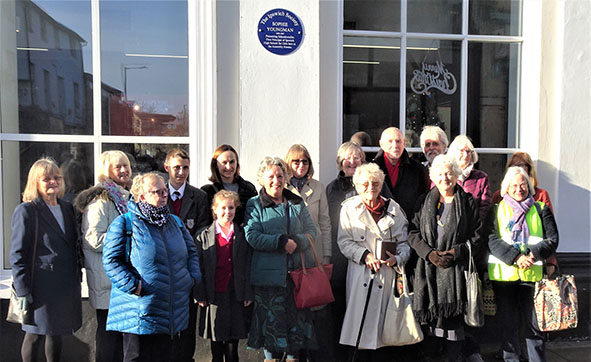- Screen Colours:
- Normal
- Black & Yellow
Below: The plaque commemorating Margaret Catchpole on The Manor House, St Margarets Green

Last December Ipswich Society, with Ipswich Women’s Festival Group, unveiled two new Blue Plaques commemorating Margaret Catchpole and Sophie Youngman, two important Ipswich women for whom learning and education played a key role in their achievements.
Margaret Catchpole (1762-1819) became a Suffolk folk heroine, capturing the public imagination through her association with local smugglers, her daring exploits in riding a stolen horse to London from Ipswich and later escaping from Ipswich Gaol. Two death sentences were commuted to transportation to Australia where she established a smallholding, learned about indigenous communities, the environment and acquired knowledge and skill in midwifery. She wrote letters home, with observations about her new life, including to her previous employer Elizabeth Cobbold, who is thought to have encouraged her thirst for learning whilst in her employment as a younger woman in Ipswich.
Margaret’s story has been fictionalised in books, film, on stage and even in an opera. 200 years after her death the Blue Plaque was installed on Manor House, St Margaret’s Green, Ipswich, where Margaret had worked as a servant for Elizabeth Cobbold.
Sophie Youngman (1849-1907) was the first headmistress of Ipswich High School for Girls, which opened in 1878. For 21 years she led and developed the school. She challenged local prejudice about education, when opinions did not favour higher education for girls. For the first time girls had the opportunity to access affordable education with a wide curriculum and opportunity to sit exams.
Her leadership and support helped many of the pupils to enter university education and gain professional qualifications. Some of the school’s early pupils were involved in the women’s suffrage movement and many took active part in World War I, including nursing at the front. The school still awards a yearly prize in her name.
The plaque honouring Sophie Youngman is displayed outside 3-5 Northgate Street, Ipswich (now EasyHotel). The building was previously known as the Assembly Rooms and was the home of the school for many years.
The unveiling of the plaques was followed by refreshments at the Ipswich Institute. Ipswich Women’s Festival Group has been actively promoting the achievements of Ipswich women for a number of years, including a commitment to redressing the under-representation of women recognised through the Blue Plaque scheme – currently 8 out of 28.
At the previous launch for four Blue Plaques in 2016, Cathy Power of English Heritage Blue Plaques commented: “A local plaque scheme is such a wonderful way to acknowledge the role of women in history and the link to the buildings in which they lived and worked”. The two new Blue Plaques will give additional public recognition to Ipswich’s exceptional women.
Ipswich Women’s Festival Group
Below: Celebrating the Sophie Youngman plaque in Northgate Street
